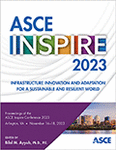Resilience Capacity of Civil Structures and Infrastructure Systems
Publication: ASCE Inspire 2023
ABSTRACT
Reliability assessment is a powerful tool in evaluating the safety level of civil structures and infrastructure systems. The underlying concept is to probabilistically compare the relative magnitudes of resistance and load effect. During the past decades, engineers and asset owners have been expanding their focus from reliability to resilience, in an attempt to adapt and manage risks in such a manner that the impacts of hazardous events on structures/systems are minimized. With this, one would naturally ask: Can we establish a unified framework for reliability and resilience analyses? This paper addresses this question, and the answer is “yes.” To this end, a new concept of “resilience capacity” is proposed, which is a generalization of the traditional load bearing capacity (resistance). By definition, the resilience capacity is a random variable that represents the structural (or system’s) ability of absorbing, recovering from and adapting to a load effect. Applying the concept of resilience capacity, this paper shows that the reliability of a structure/system is a special case of resilience.
Get full access to this article
View all available purchase options and get full access to this chapter.
REFERENCES
Akiyama, M., Frangopol, D. M., and Ishibashi, H. (2020). “Toward life-cycle reliability, risk- and resilience-based design and assessment of bridges and bridge networks under independent and interacting hazards: emphasis on earthquake, tsunami and corrosion.” Structure and Infrastructure Engineering, 16(1), 26–50.
Attoh-Okine, N. O., Cooper, A. T., and Mensah, S. A. (2009). “Formulation of resilience index of urban infrastructure using belief functions.” IEEE Systems Journal, 3(2), 147–153.
Ayyub, B. M. (2015). “Practical Resilience Metrics for Planning, Design and Decision Making.” ASCE-ASME J. Risk Uncertainty Eng. Syst., Part A: Civil Eng., 1(3), 04015008.
Ayyub, B. M. (2014). “Systems Resilience for Multi-Hazard Environments: Definition, Metrics and Valuation for Decision Making.” Risk Analysis, 34(2), 340–355.
Baker, J. W. (2008). “Introducing correlation among fragility functions for multiple components.” 14th World Conference on Earthquake Engineering, October 12–17, 2008, Beijing, China.
Basu, D., Misra, A., and Puppala, A. J. (2015). “Sustainability and geotechnical engineering: perspectives and review.” Canadian Geotechnical Journal, 52(1), 96–113.
Bruneau, M., Chang, S. E., Eguchi, R. T., Lee, G. C., O’Rourke, T. D., Reinhorn, A. M., Shinozuka, M., Tierney, K., Wallace, W. A., and Von Winterfeldt, D. (2003). “A framework to quantitatively assess and enhance the seismic resilience of communities.” Earthquake Spectra, 19(4), 733–752.
Cremen, G., Seville, E., and Baker, J. W. (2020). “Modeling post-earthquake business recovery time: An analytical framework.” International Journal of Disaster Risk Reduction, 42, 101328.
Ellingwood, B. R. (2005). “Risk-informed condition assessment of civil infrastructure: state of practice and research issues.” Structure and Infrastructure Engineering, 1(1), 7–18.
Mackie, K., and Stojadinović, B. (2006). “Post-earthquake functionality of highway overpass bridges.” Earthquake Engineering & Structural Dynamics, 35(1), 77–93.
Melchers, R. E., and Beck, A. T. (2018). Structural reliability analysis and prediction. John Wiley & Sons.
Nielson, B. G., and DesRoches, R. (2007). “Analytical seismic fragility curves for typical bridges in the central and southeastern United States.” Earthquake Spectra, 23(3), 615–633.
Park, J., Seager, T. P., and Rao, P. S. C. (2011). “Lessons in risk-versus resilience-based design and management.” Integrated Environmental Assessment and Management, 7(3), 396–399.
Renschler, C. S., Frazier, A. E., Arendt, L. A., Cimellaro, G. P., Reinhorn, A. M., and Bruneau, M. (2010). A framework for defining and measuring resilience at the community scale: The PEOPLES resilience framework. MCEER Buffalo.
Salomon, J., Broggi, M., Kruse, S., Weber, S., and Beer, M. (2020). “Resilience decision-making for complex systems.” ASCE-ASME J Risk and Uncert in Engrg Sys Part B Mech Engrg, 6(2), 020901.
Salomon, J., Behrensdorf, J., Winnewisser, N., Broggi, M., and Beer, M. (2022). “Multidimensional resilience decision making for complex and substructured systems.” Resilient Cities and Structures, 1(3), 61–78.
Wang, C. (2021). Structural Reliability and Time-Dependent Reliability. Springer Nature, Switzer- land AG.
Wang, C., and Ayyub, B. M. (2022). “Time-Dependent Resilience of Repairable Structures Subjected to Nonstationary Load and Deterioration for Analysis and Design.” ASCE-ASME Journal of Risk and Uncertainty in Engineering Systems, Part A: Civil Engineering, 8(3), 04022021.
Wang, C., and Zhang, H. (2020). “Assessing the seismic resilience of power grid systems considering the component deterioration and correlation.” ASCE-ASME Journal of Risk and Uncertainty in Engineering Systems, Part B Mechanical Engineering, 6(2), 020903.
Wang, C., Zhang, H., Ellingwood, B. R., Guo, Y., Mahmoud, H., and Li, Q. (2020). “Assessing post-hazard damage costs to a community’s residential buildings exposed to tropical cyclones.” Structure and Infrastructure Engineering, 17(4), 443–453.
Information & Authors
Information
Published In
History
Published online: Nov 14, 2023
ASCE Technical Topics:
- Design (by type)
- Engineering fundamentals
- Foundation design
- Foundations
- Geotechnical engineering
- Infrastructure
- Infrastructure resilience
- Load bearing capacity
- Load factors
- Mathematics
- Probability
- Structural design
- Structural engineering
- Structural reliability
- Structural safety
- Structural systems
- System reliability
- Systems engineering
- Systems management
Authors
Metrics & Citations
Metrics
Citations
Download citation
If you have the appropriate software installed, you can download article citation data to the citation manager of your choice. Simply select your manager software from the list below and click Download.
